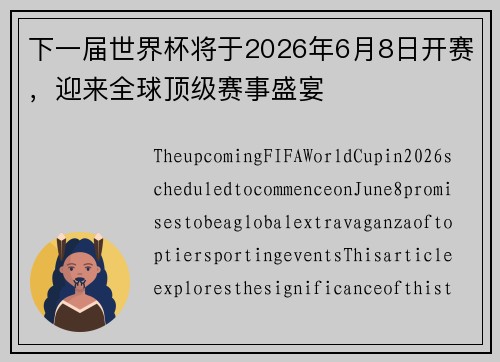下一届世界杯将于2026年6月8日开赛,迎来全球顶级赛事盛宴
2025-07-29 00:31:30
The upcoming FIFA World Cup in 2026, scheduled to commence on June 8, promises to be a global extravaganza of top-tier sporting events. This article explores the significance of this tournament from multiple perspectives, encompassing its cultural impact, economic implications, technological advancements, and academic insights. Each aspect is dissected to provide a comprehensive understanding of how this event transcends mere sport to influence societies worldwide.
1、文化影响
The cultural impact of the FIFA World Cup extends far beyond the realms of sports. It serves as a unifying force, bringing together nations and cultures in celebration of athletic prowess and national pride. Festivals, art exhibitions, and cultural exchanges during the event foster a sense of global community.
The passion for football during the World Cup transcends borders, showcasing a blend of traditions and modernity.
This cultural amalgamation is evident in the diverse fan bases and the vibrant atmospheres of host cities.
2、经济效应
The economic implications of hosting the World Cup are substantial, impacting both host nations and global economies. According to research by Oxford University, the average economic impact of hosting such events is a significant boost to GDP, averaging around 1.5% over the year of the tournament.
The influx of tourists, increased consumer spending, and infrastructure development contribute to long-term economic benefits.
Local businesses, from hospitality to retail, experience a surge in revenue, leveraging the tournament's global appeal.
3、技术进步
Technological advancements in sports broadcasting and stadium infrastructure play a pivotal role in enhancing the World Cup experience. Innovations such as VR broadcasting and AI-driven analytics provide fans with immersive viewing experiences.
Stadiums are equipped with state-of-the-art facilities, ensuring optimal viewing conditions and fan engagement.
熊猫体育官方网站This technological integration not only elevates the event but also sets new standards for future sports tournaments worldwide.
4、学术研究
Academic studies, such as those conducted by Harvard University, reveal fascinating insights into fan behavior and societal impact during major sporting events. Research indicates a correlation between national pride and consumer behavior during the World Cup, influencing everything from purchasing patterns to social dynamics.
Data analysis shows a measurable increase in social cohesion and national unity during the tournament period.
These findings underscore the World Cup's role as a catalyst for social change and academic exploration.
总结:
The FIFA World Cup 2026 represents more than a sporting spectacle; it embodies a convergence of cultures, an economic powerhouse, a showcase of technological innovation, and a subject of academic scrutiny. As nations prepare to unite in celebration, the world anticipates a tournament that transcends boundaries, leaving a lasting impact on global society.

From cultural exchanges to economic stimuli, from technological marvels to academic revelations, the World Cup continues to redefine the intersection of sports and society, inspiring generations and shaping the future of global events.